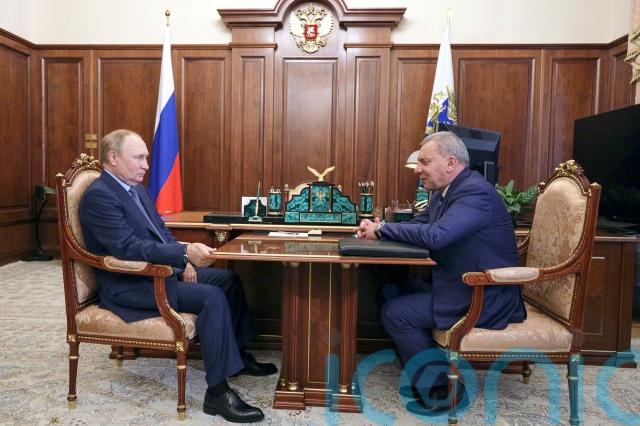
Russia will pull out of the International Space Station after 2024 and focus on building its own orbiting outpost, the country’s new space chief said amid high tensions between Moscow and the West over the fighting in Ukraine.
Yuri Borisov, who was appointed this month to lead the state space agency Roscosmos, said during a meeting with Russian President Vladimir Putin that Russia will fulfil its obligations to its partners before it leaves the project.
“The decision to leave the station after 2024 has been made,” Mr Borisov said, adding: “I think that by that time we will start forming a Russian orbiting station.”
His statement reaffirmed previous declarations by Russian space officials about Moscow’s intention to leave the space station after 2024 when the current international arrangements for its operation end.

Nasa and other international partners hope to keep the space station running until 2030, while the Russians have been reluctant to make commitments beyond 2024.
The space station is jointly run by the space agencies of Russia, the US, Europe, Japan and Canada.
The first piece was put in orbit in 1998, and the outpost has been continuously inhabited for nearly 22 years.
It is used to conduct scientific research in zero gravity and test out equipment for future space journeys.
It typically has a crew of seven, who spend months at a time aboard the station as it orbits about 250 miles from Earth.
The complex, which is almost as long as a football field, consists of two main sections, one run by Russia, the other by the US and the other countries.
It was not immediately clear what will have to be done to the Russian side of the complex to continue safely operating the space station once Moscow pulls out.
The Russian announcement is certain to stir speculation that it is part of Moscow’s manoeuvring to win relief from western sanctions over the conflict in Ukraine.
From the creation of drug treatments to studies of the Earth helping us better understand our changing planet, the @Space_Station has provided benefits to humanity for more than two decades. Check out the ISS Benefits for Humanity publication out today! https://t.co/3J5EWmB4Ji pic.twitter.com/cpIre3Kc6j
— ISS Research (@ISS_Research) July 25, 2022
Mr Borisov’s predecessor, Dmitry Rogozin, said last month that Moscow could take part in negotiations about a possible extension of the station’s operations only if the US lifts the sanctions it imposed on Russian space industries.
With Elon Musk’s SpaceX company now flying Nasa astronauts to and from the space station, the Russian Space Agency lost a major source of income.
For years, Nasa had been paying tens of millions of dollars per seat for rides to and from the station aboard Russian rockets.
Despite the tensions over Ukraine, Nasa and Roscosmos struck a deal earlier this month for astronauts to continue riding Russian rockets and for Russian cosmonauts to catch lifts to the space station with SpaceX beginning this autumn.
But the flights will involve no exchange of money.
The agreement ensures that the space station will always have at least one American and one Russian on board to keep both sides of the outpost running smoothly, according to Nasa and Russian officials.
Moscow and Washington co-operated in space even at the height of the Cold War, when Apollo and Soyuz spacecraft docked in orbit in 1975 in the first crewed international space mission, helping improve US-Soviet relations.
Subscribe or register today to discover more from DonegalLive.ie
Buy the e-paper of the Donegal Democrat, Donegal People's Press, Donegal Post and Inish Times here for instant access to Donegal's premier news titles.
Keep up with the latest news from Donegal with our daily newsletter featuring the most important stories of the day delivered to your inbox every evening at 5pm.